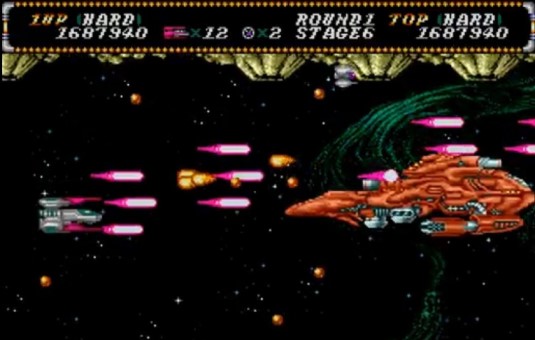
For those unfamiliar with the 16-bit console wars of almost 30 years ago (sniff), the MegaDrive had its Super Nintendo rival licked on shooters. With the odd notable exception, Sega's machine was overflowing with space-based shooting action. You could put it down to a paucity of original thinking, just as nearly every other game released on Nintendo's eight bit system was a platform game. Or it might have something to do with the more mature audience the MegaDrive/Genesis allegedly catered for. Whatever. During the period just prior to the coming of Final Fight and Street Fighter II the shoot 'em up ruled the arcades, and as the MegaDrive was retailed on the basis of its arcade quality jiggery pokery it made sense for so many games of this kind to make the trip over. Even if the games were quite obscure and barely did any business outside of Japan.
Hellfire was one such game. Hitting the arcades in 1989 it made no impact beyond hardcore blaster fans, and didn't attract the attentions of European software houses who would happily convert almost anything and everything to the home micros. I mean, even something as obscure as Atomic Robo Kid got the Commodore 64 treatment. Still, as a Toaplan-developed game it was bound to get a port to Japanese systems, which meant the PC Engine CD and the humble MegaDrive. Quite why Hellfire was selected by Sega of America and Sega Europe to make it out of Japan when so many others didn't is a mystery. Perhaps the rave reviews it got on import, especially by Mean Machines and C&VG, helped. While then, as now, only a minority of the gaming public followed the doings of review outlets, getting acclaim spread awareness among hardcore gaming crowds. And of this Hellfire duly benefited, regularly feted alongside Gynoug as perhaps the best MegaDrive shooter. What's so special?
Looking at the screenshots doesn't suggest much. While crisp and functional, the graphics were hardly displays of technical virtuosity like the aforementioned Gynoug, nor up to the standards of Thunderforce IV or Ranger X, which came later. And the plotting of the game was the same as every horizontal shooter from Gradius to your bevies of bullet hells. Formations of enemies swarm onto the screen to be shot down quicker than nuanced discussion of Labour's anti-semitism crisis, and mid-level and end of level is occasioned by some boss entity of varying difficulty. So far, so standard. And yes, there is a suitably rockin' soundtrack to help you along. Where then is Hellfire's secret, the omega point of its praise? This was gameplay divinity divided. You had the gimmick - not the titular Hellfire bomb that launched a beam of unadulterated screaming energy at your foes - but something more valuable. Directional shot. Hitting the B button changed your direction from front to behind, and from there to above and below simultaneously, and thence from all four corners of your ship. A very simple mechanic and one demanding rapid toggling at times, but an obviously useful one other 16-bit shooters tended to avoid. But a mechanic doesn't maketh a game. What does is gameplay. What establishes Hellfire as so beguiling is not just ease of play, but how it sucks you in. The game starts off easy enough with a few simple enemy patterns and an opportunity to get used to using the directional fire. Both the level's bosses also require you take them on by firing up their nooks and crannies. But from the second level on, the difficulty, like all good games, raises a pitch until the end level which, in any other game, would be regarded as a boss rush with sizeable super hard enemies. Yet Hellfire is difficult for the right reasons. There are no unfair deaths, your mistakes are your own. But what does punish is the immediate stripping of your power ups upon reincarnation - not good, but not impossible to claw your way back up to the power league.
Hellfire then was well 'ard, and was the sort of challenge hardened gamers craved on the MegaDrive. I remember picking it up on official release when £34.99 was a lot of money, and never beating it. It was only years later after disinterring the MegaDrive and embarking on a chequered career as a sometime retro game collector did I finally manage it without cheating. You see, what got me through the game was something that only comes with age - patience. Taking things slowly, learning from the hundreds of game overs, but not trying to rush through tight corners and tricky situations is the key to completion. That and not getting too many speed power ups (to be fair, that was a lesson I'd learned as a spotty teenager).
Hellfire works and continues to stand up as a solid game precisely because it eschewed the showy stuff that might horribly date it. This is uncomplicated challenge, no frills and no messing - just you, a ship, laser beams and an armada of robot and biomechanical villainy to blow to bits. What better distraction is there when the mind craves simplicity?
1 comment:
Nice review! Hellfire is an awesome shooter. Right now I'm struggling in the last level, perhaps the only stage where if you lose a ship there is little to do - I literally lost 23 lives from a no-death playtrough thanks to those green ships section.
As you said, the charm of this and other 16-Bit shooters is the time you need to spend with the game to really enjoy it. There is no easy way out or some "real-life emulation" to catch your attention, it just needs skill; it is a game, after all. I found some rest from our daily chaos on these bullet-dodging wonders :)
Post a Comment